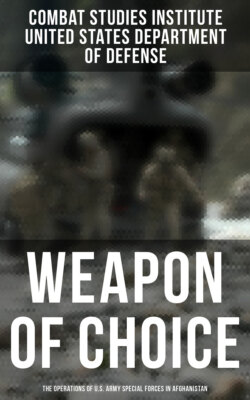Читать книгу Weapon of Choice: The Operations of U.S. Army Special Forces in Afghanistan - Combat Studies Institute - Страница 17
На сайте Литреса книга снята с продажи.
Civil Affairs to Islamabad, Pakistan
ОглавлениеIn his remarks to the State Department on 4 October 2001, President Bush declared that “we are friends of the Afghan people,” pledging $320 million for humanitarian aid. He emphasized that the United States was not alone in this effort: “We will work with the UN agencies such as the World Food Program and work with private volunteer organizations to make sure this assistance gets to the people.” Three nights later, the commander of the 96th Civil Affairs Battalion (CAB) knocked on MAJ Matt DiJurnigan’s (pseudonym) door and told him, “Pack your bags.” This former marine and Army enlisted soldier, and DESERT STORM infantry company commander suddenly found himself a “first responder” to the president’s pledge.
On 9 October, DiJurnigan was in Tampa at the U.S. Central Command (CENTCOM) as the 96th CAB liaison officer in the civil-military operations cell in the J5 section. As the liaison officer to CENTCOM, he was familiar with the headquarters, the civil-military operations staff, and his normal duties. What he had not expected was his assignment on 12 October to the CENTCOM liaison cell at the U.S. Embassy in Islamabad, Pakistan. DiJurnigan’s mission was to determine whether there was a need to establish a civil-military operations center (CMOC) in Pakistan to implement the president’s desires.
A CMOC serves as the primary interface between the U.S. Armed Forces and the local population, humanitarian organizations, nongovernmental organizations (NGOs), international organizations, the UN, multinational forces, and other U.S. government agencies. Basically, the CMOC can help prioritize humanitarian support and ensure that civilian organizations do not attempt to begin relief efforts in areas where there is active combat. To accurately assess whether a CMOC was required, DiJurnigan met first with the Department for International Development in London to determine the level of assistance for CA that Great Britain would provide. Then, in Islamabad, DiJurnigan met with BG Ronald Sams, the chief of the CENTCOM liaison cell; the director of the UN Office for Coordination of Humanitarian Affairs–Afghanistan; the UN Joint Logistics Cell; United Nations International Children’s Emergency Fund (UNICEF) representatives; the head of the UN Mine Committee, and the five UN regional coordinators created for Afghanistan. After meeting with these officials and representatives from numerous NGOs, DiJurnigan concluded that a CMOC was not necessary and recommended against its establishment. In his view, the humanitarian relief effort was “mature,” and military coordination of the effort was unnecessary. He recommended, instead, that a military CA cell be collocated with the UN Joint Logistics Cell that channeled all humanitarian assistance into Afghanistan. Ideally, all aid organizations would coordinate their efforts through the international cell that could balance requests for support and information with available resources and receive early notice of potential new donors. Unfortunately, many NGOs elected to operate independently, thus minimizing the advantages of the UN cell.
Figure 30. Islamabad in relation to Afghanistan.
In late October 2001, DiJurnigan was the only American CA officer working on humanitarian assistance issues with the help of three British soldiers. This severely limited his ability to coordinate with the multitude of NGOs arriving in theater. DiJurnigan realized that his initial recommendation against a CMOC might have been premature and requested a civil affairs team (CAT) from his battalion. On Thanksgiving Day 2001, Captain (CPT) Marty Cavanaugh (pseudonym), with three members of CAT-A46, arrived in Islamabad from D Company, 96th CAB. The team quickly began developing new contacts and exploiting those contacts that DiJurnigan had made. Their “full court press” to meet with as many NGOs as possible opened significant lines of communication that later paid great benefits.
